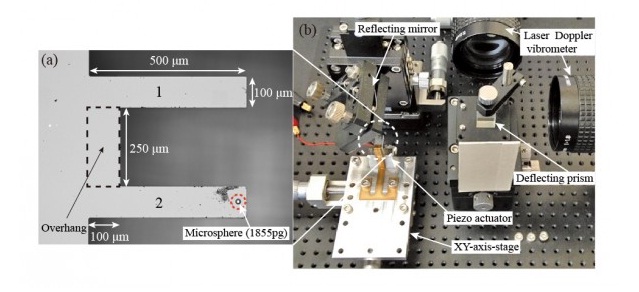Jun 3 2015
Working with a device that slightly resembles a microscopically tiny tuning fork, researchers at the University of Tsukuba in Japan have recently developed coupled microcantilevers that can make mass measurements on the order of nanograms with only a 1 percent margin of error -- potentially enabling the weighing of individual molecules in liquid environments. The findings are published this week in Applied Physics Letters, from AIP Publishing.
 Coupled microcantilevers are placed on the XY-axis-stage and moved by the piezoelectric actuator according to the proposed feedback control to produce self-excited oscillation. Credit: Yabuno Lab./University of Tsukuba
Coupled microcantilevers are placed on the XY-axis-stage and moved by the piezoelectric actuator according to the proposed feedback control to produce self-excited oscillation. Credit: Yabuno Lab./University of Tsukuba
The group's coupled microcantilevers measure mass on the cellular and subcellular scale by using self-excited oscillation, a process in which the feedback of an oscillating body controls the phase of the power source acting on it, allowing for sustained periodic motion.
"Unlike the previous measurements made by coupled cantilevers, which can detect the existence of small mass but cannot quantitatively measure the mass, it doesn't require a special measurement environment, such as an ultrahigh vacuum," said Hiroshi Yabuno, a professor at the University of Tsukaba in Japan.
Yabuno's graduate students Daichi Endo and Keiichi Higashino performed the measurements, and Yasuyuki Yamamoto and Sohei Matsumoto, collaborators at the National Institute of Advanced Industrial Science and Technology, constructed the coupled microcantilevers using MEMS device manufacturing methods.
As all biological processes must take place in a liquid environment, this makes the group's cantilevers ideal for processes such as detecting DNA hybridization and characterizing, at the single cell level, whole proteomes -- data that shows globally within such a cell which proteins are expressed where and when as a result of instructions contained in an organism's DNA genome.
"From the features of the proposed method, it's easy to expect that we can obtain the same accuracy in a liquid environment," Yabuno said.
The coupled cantilever, constructed from an etched silicon-insulator-silicon wafer, resembles a tiny tuning fork whose prongs measure 500 by 100 micrometers. The researchers tested their cantilever's capacities by measuring the mass of polystyrene microspheres, which have a mean diameter of 15.0 micrometers -- the same order of magnitude as a liver cell.
In their setup, a sphere was placed on one of the prongs -- in a biological system, samples would be affixed by covalent mobilization, Yabuno said.
The prongs were then both stimulated by a piezo actuator, a device that converts an electrical signal into a controlled physical displacement. In order to induce self–excited oscillation in the cantilevers, the motion of the actuator is automatically adjusted by a suitable feedback referring to the motion of one of the cantilevers.
The sphere's presence on one of the prongs results in a mass difference ratio between the two, which affects the ensuing vibrations, as measured by a pair of laser Doppler vibrometers and observed in spectrum analysis of the cantilever's oscillating frequencies.
"The method can be applied to more down-sized, nano-scale, coupled cantilevers," Yabuno said. "It can be expected to realize the measurement of infinitesimal mass, which is impossible in existing methods, even in any measurement environments."
Future work for Yabuno and his colleagues involves using the cantilevers to obtain high-accuracy quantitative measurements of biological samples such as human cells and DNA in liquid media.